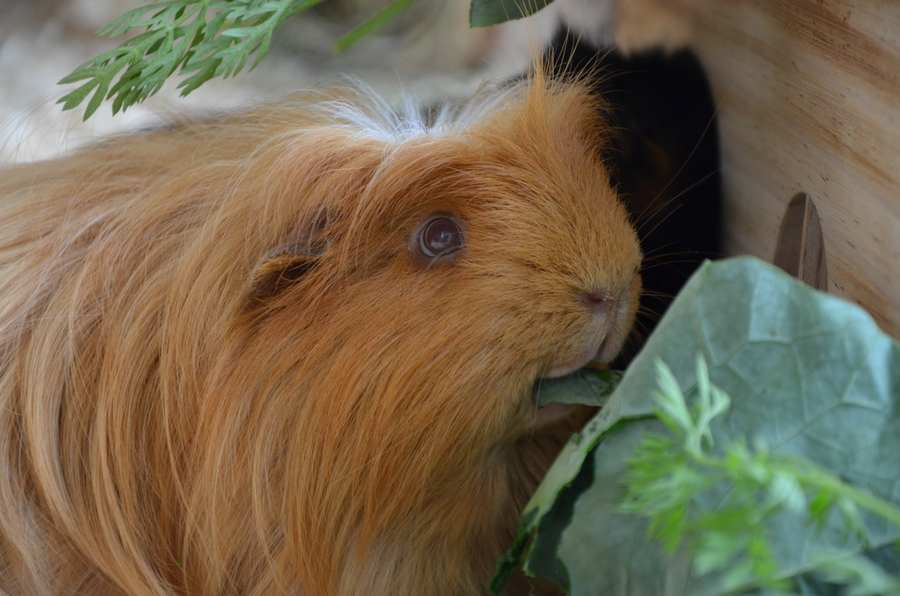Guinea pigs are a common pet, however, they after often misunderstood. These adorable creatures are much more than a small rodent in a cage!
They have big personalities and specific tastes that truly make them engaging pets. Typically, guinea pigs are considered great first-time pets for children.
However, guinea pigs require a bit more attention than people might think. They need constant attention to be fed fresh veggies and hay as well as a multitude of other things.
It is important to realize that guinea pigs, just like other pets, can experience health problems. This is why it is important for older children to have them as pets or adults.
One of the most noticeable issues that guinea pigs can experience is eye problems.
Guinea pigs have delicate eyes that are prone to a variety of issues. Some of these issues require treatment while other issues are a result of older age. It is important to know the various eye problems that can appear in guinea pigs to know whether or not they might be serious.
This way, any potential health issues can be noticed. Noticing health issues in guinea pigs isn’t always easy as some issues don’t showcase many symptoms.
Knowing the various eye problems will help determine if the guinea pig needs to be taken to the vet.
Guinea pigs must be taken to exotic pet vets as regular vets generally aren’t qualified to treat or examine guinea pigs or other rodents.
Below are the different types of eye problems that guinea pigs can experience!
Common Guinea Pig Eye Problems
| Cloudy eyes | Redness of eyes |
| Watery eyes | Inflammation |
| Bulging eyes |
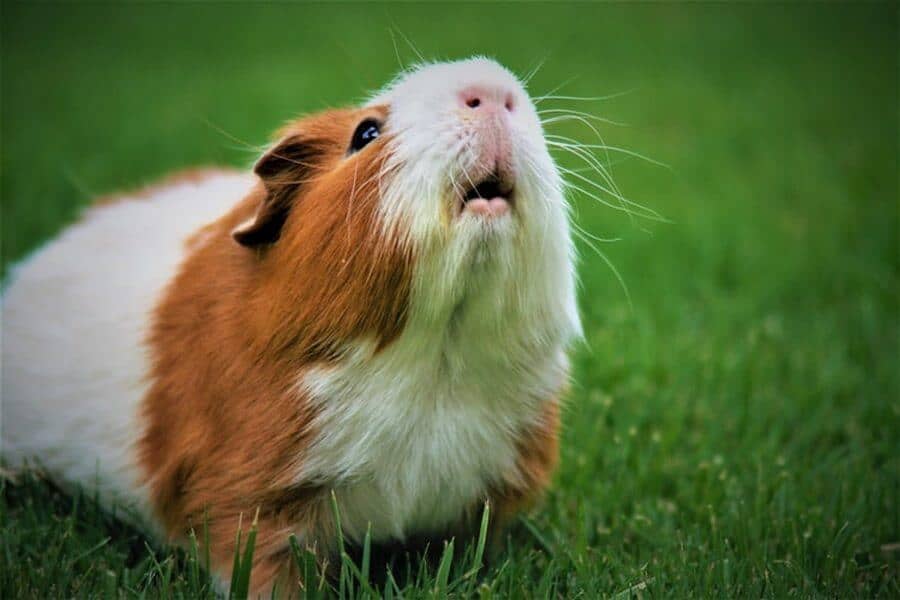
These common eye problems can derive from different things. Sometimes, the guinea pig can have other underlying issues such as diabetes, teeth issues, or simply a scratched eye.
Moreover, things like bulging eyes where there is a fatty white deposit that forms around the bottom part of the eye are often a genetic issue that forms when the guinea pig gets older in age.
Cloudiness of the eye is also the result of aging. Guinea pigs, in general, do not have great eyesight, so the cloudiness that forms with age can reduce their eyesight.
This isn’t to say that they are going blind, they are just getting small spots of cloudiness in their eyes.
Although some of these issues are the result of genetics or again, some of them can be a result of underlying issues or rather an eye infection.
Eye infections can occur when the guinea pig’s eyes experience some form of trauma. This trauma is generally associated with debris that could have entered the guinea pig’s eyes.
The most common debris that enters a guinea pig’s eye is hay. It’s no secret that guinea pigs love hay. They love to eat it, play in it, and sleep in it!
During their adventures in the hay, there is a possibility for hay debris to get into their eyes. To help reduce the risk of this, it is important to keep hay condensed to one area and cleaned up when dirtied up as often as possible.
Hay racks or corrals are a great way to keep hay contained so that guinea pigs aren’t rolling around in the hay itself. If hay gets in the eye, it can cause inflammation or redness which might require some form of treatment from an exotic vet.
While debris can cause eye infections in guinea pigs, another common cause of eye infections is a bacterial or fungal infection that is a result of a dirty cage.
Guinea pigs relieve themselves quite often. Typically, they do so just about anywhere in their cage.
They have very sensitive respiratory systems and eyes, so it is important to spot clean the cage and totally clean it out at least once a week. An unclean cage can cause eye infections and respiratory issues.
Debris and dirty cages are a large reason these symptoms appear within a guinea pig’s eyes, however, what other underlying issues could cause eye problems? Below are other issues that can form eye issues in guinea pigs.
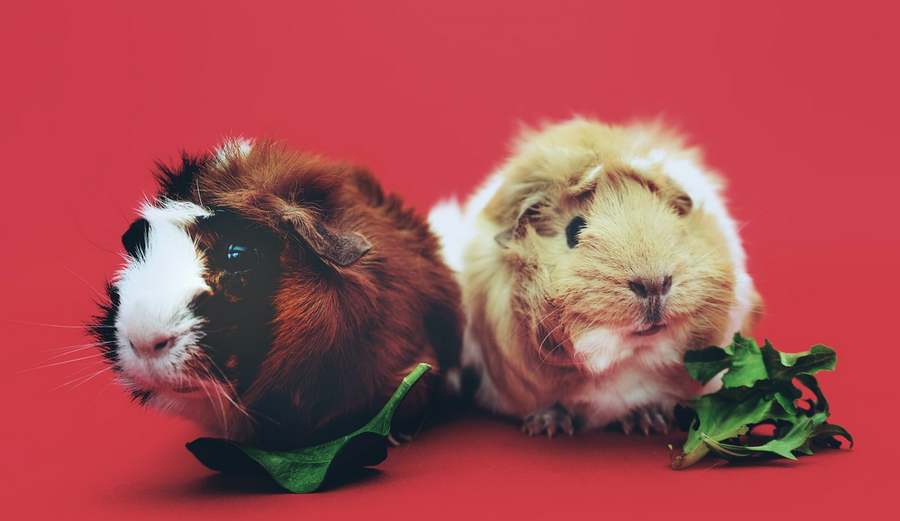
Overgrown Guinea Pig Teeth Problems
Teeth problems are an unfortunate issue that happens in some guinea pigs. The largest problems in guinea pigs are overgrown teeth.
Overgrown teeth occur when a guinea pig isn’t getting enough to help grind down its teeth. Their teeth are always growing! This is why having access to hay and wood chew toys is very critical.
It literally grinds their teeth down and reduces the risk of overgrown teeth. If their teeth become overgrown, it can apply pressure to the eye ducts causing inflammation and even watering eyes.
Sometimes, depending on the situation it could require surgery. However, a vet visit should be able to assess the situation.
Corneal Ulcers In Guinea Pigs
Corneal ulcers can form when the eye is scratched or becomes irritated. Typically, this is due to hay debris or even bedding debris (the paper bedding used to capture urine or feces).
These ulcers are painful, however, it isn’t noticeably painful to pet owners. The guinea pig might rub their eye with their paw or keep it closed.
In severe cases, they might stop eating. When a guinea pig stops eating or drinking, this is a sign that something is medically wrong with them.
Considering they don’t have another way to showcase any issues, it is important to always ensure they eat or drink. The easiest way to treat these ulcers is through eye ointments that are meant for small rodents.
Eye Infections From Dirty Guinea Pig Cage
Fungal or bacterial issues due to a dirty cage are the biggest culprit behind an eye infection. Eye infections transpire in the form of pus or irritation that is very noticeable on the eye.
There are a couple of ways to treat these infections. The first is the same as treating a corneal ulcer, through eye ointment. The other common way to treat eye infections is through antibiotics.
There aren’t many antibiotics that guinea pigs can take, however, the ones they can take are generally pretty effective. These antibiotics are usually given orally through an eye dropper syringe.
Guinea pigs don’t usually care for the process of receiving the medicine, so it is important to offer them their favourite veggie after administering the medication.
These are the most common issues that occur with a guinea pig’s eyes. While they are common and some seem quite scary, they are generally treatable and a guinea pig can lead a healthy life!
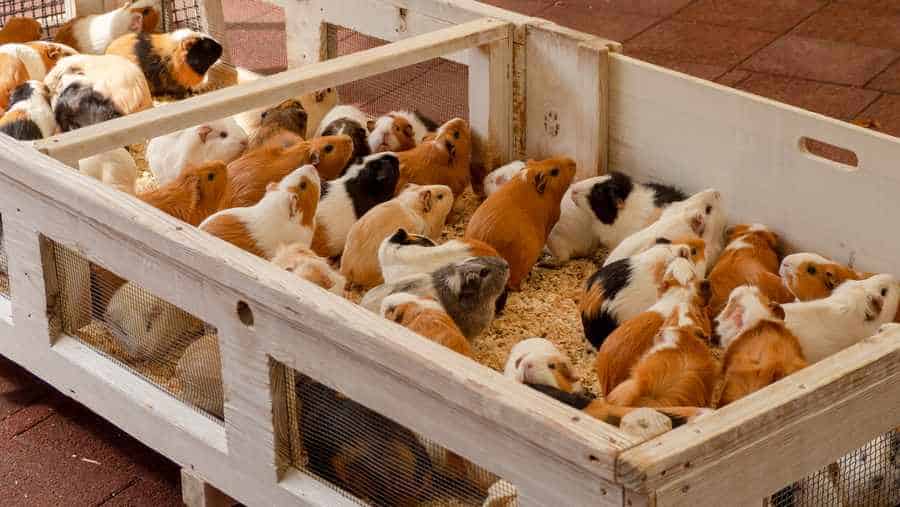
Why Are My Guinea Pig’s Eyes Watery?
Watery eyes are a universal issue that can occur in any type of pet. Watery eyes in guinea pigs is usually an indication of something else going on. Overgrown teeth is usually the culprit behind this issue. A guinea pigs back teeth can overgrow and push against the eye ducts causing them to water.
Once again, this might require surgery on the guinea pig’s teeth. Like other pets, watering eyes can cause tear stains on the fur around the eyes or eye crusties.
Eye crusties usually mean that there is an infection that might be present. If these symptoms are witnessed, it could be necessary to take a guinea pet to their exotic vet to investigate.
It is important to note that not every eye issue could cause a trip to the vet. Those trips could get expensive and the overall symptoms of the guinea pig should be assessed.
Pet owners should always ask themselves if the piggie is eating, drinking, and relieving itself normally?
If those three things are presumably normal, then chances are it isn’t an issue that would need to be treated.
However, pet owners are certainly more welcome to still go to the vet just to be sure if that is an option for them.
A common eye occurrence in guinea pigs can also be identified as an opaque, white secretion from the eye ducts.
It looks scary at first because it is generally a lot of white looking liquid coming from the corners of the eyes.
This is completely normal and pet owners should not be alarmed by this event. Guinea pigs clean themselves and rarely require baths (unless they are a certain breed of guinea pig with long hair that gets dirty quickly!).
The primary way they clean themselves is with this white liquid that comes from their eyes.
Upon close inspection, pet owners will witness the guinea pig using their paws to collect the white secretion and then wiping their heads or face with the liquid in quick motions with their paws.
It is absolutely necessary for them and in fact, it is quite adorable to see! In this same process, they also use their mouths to clean their upper bellies and arm areas.
The first time a pet owner sees the white liquid they might mistake this for watery eyes, but alas, it is simply their method of cleaning themselves!
How Do You Treat An Eye Infection In A Guinea Pig?
Exotic vets are experts in knowing how to treat small animals like guinea pigs. Guinea pigs have sensitive systems with limited ways to treat them. There are only a few antibiotics that guinea pigs can take such as eye drops made specifically for small animals to treat eye infections.
However, some eye infections might be treated with an oral, liquid antibiotic. This antibiotic looks very similar to Pepto-Bismol, but it is not the same. It is the same bright pink though!
Whether it is an eye drop or an oral antibiotic that needs to be administered through an oral syringe, you should always have a second person handy to help.
It simply makes the process easier if someone holds the piggie while the medication is being applied or administered.
Guinea pigs are prey animals so their natural behaviour does make them a little scared of new situations. The person holding the piggie should softly talk to them, pet them, and even offer them veggie treats between applications of medication.
To properly hold a guinea pig that needs some form of medication, it is important to get a towel or blanket to set their butts on.
This creates a soft, comfortable surface for them. One hand should be placed under the bum as well to give extra support and the towel serves as a soft surface if they squirm away.
The other hand should be placed under their little arms and never above them. This prevents any accidental choking and is the mid-section of the piggie. It simply provides the best stance to keep the piggie still.
If you have eye drops to put in their eyes, have your human partner hold the piggie as specified. It is important to already have the eye medication ready to be dropped in the eyes.
Facing the guinea pig, offer them a fresh veggie to distract them. Their eyes are always open and they even sleep with their eyes open. They rarely close their eyes. Because of this, you don’t need to hold their eyes open.
Placing the eye dropper close to their eyes, but mostly out of the sight of the guinea pig and lightly squeeze the medication in their eye.
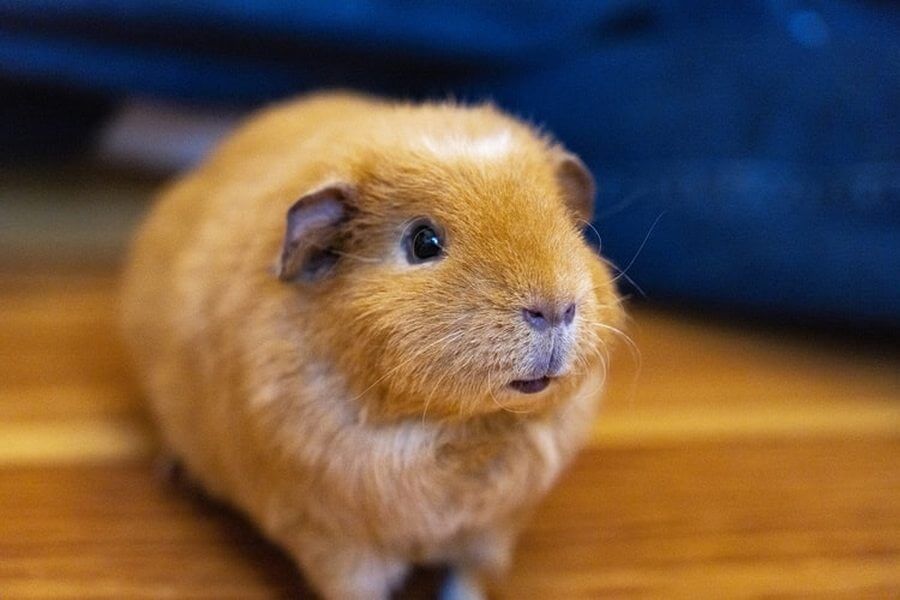
They will probably blink and that’s okay. Only use as directed by the vet.
If you have oral antibiotics to use, it will be a bit harder to give them. Guinea pigs do not like their mouths messed with. Some guinea pigs don’t mind it but most of them will fuss.
This is where your human partner will need to do the most work. The hand that is under the piggie’s arms will need to become a little firmer to ensure they are holding them still.
Always have the medication preloaded into the oral syringe to the proper dosage. You will need to use one hand to partially pry their mouth open to get the syringe towards the back of their mouth.
Then quickly squeeze the plastic plunger on the syringe to squirt the medication into their mouth.
Some of the medication will spill out as the guinea pig tries to chew on the syringe.
There really isn’t any way to avoid this other than trying to put the syringe nozzle as close to the back of the mouth as possible without choking the piggie.
As long as they get most of it, they will be fine. Never, ever, give a double dose. Only provide one dose at a time, even if the guinea pig fusses and some medication is lost.
The amount of time that a guinea pig needs antibiotic treatment, whether orally or through eye drops, could depend on the severity of the issue.
Oral antibiotics are also used for other issues like teeth problems or skin and fur problems.
Generally, they will need to do it once or twice a day for up to two weeks. Ultimately, the exotic vet will determine how long they will need the treatment.
It is important to always keep them in the loop on the progress of the eye issue (or other medical issues) so they can properly assign the treatment length.
Can You Use Human Eye Drops On Guinea Pigs?
Human eye drops should never be used on guinea pigs. Exotic vets will know the best eye drops to use on them. Human eye drops have other ingredients in them that aren’t safe for a guinea pigs eyes.
Once again, guinea pigs are pretty sensitive to most things. This includes scents or various ingredients in things and this is primarily due to their respiratory systems being so fragile.
Because of their sensitivities, it is never a good idea to use a human medication on them in case there is something in it that could harm the piggie.
The most important thing to remember when owning a guinea pig is to always watch out for any potential signs of an issue like not eating or drinking or relieving themselves.
Guinea pigs are amazing pets that experience health issues just like any other pet.
While they are quite sensitive to their surroundings they are still fun-loving and interesting pets to own!
More Pages On House Pets
Guinea pigs are one of the world's most unique and adorable rodent pets. These creatures have such large personalities and are often misunderstood. Having a guinea pig as a pet comes with...
Getting a guinea pig for a pet is such an exciting experience! These adorable rodents are quirky pets that are really fun to engage with. Guinea pigs have a reputation of being boring, however, this...


